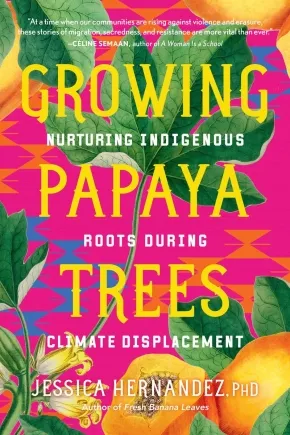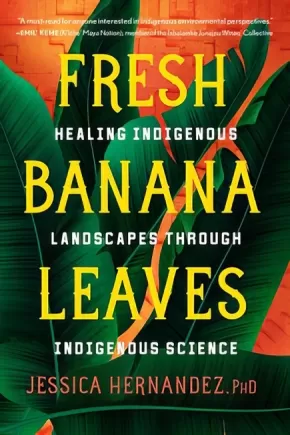Zapotec
Synopsis:
Leading Binnizá and Maya Ch'orti' scientist Jessica Hernandez, PhD, weaves together Indigenous knowledge, environmental science, and personal family stories in her highly anticipated follow-up to the LA Times best-seller Fresh Banana Leaves.
Not every environmental problem is a result of climate change, but every environmental and climate change problem is a result of colonialism.
Dr. Jessica Hernandez offers readers an Indigenous, Global-South lens on the climate crisis, delivering a compelling and urgent exploration of its causes—and its costs. She shares how the impacts of colonial climate catastrophe—from warming oceans to forced displacement of settler ontologies—can only be addressed at the root if we reorient toward Indigenous science and follow the lead of Indigenous peoples and communities.
Growing Papaya Trees explores:
- Energy as a sociopolitical issue
- The interconnectedness of natural disasters, sociopolitical turmoil, and forced migration
- Our oceans, our forests, and our Indigenous futures
- Moving Indigenous science from mere acknowledgement into real action
- How to nourish Indigenous roots when displaced beyond borders
Dr. Hernandez asks: what does it mean to be Indigenous when we’re separated from our lands? How do we nurture future generations knowing they, too, will have to live away from their ancestral places? She illuminates that cultures are not lost, even amid genocide, turmoil, war, and climate displacement—and shows us how to be better kin to each other against the ecological violence, colonial oppression, and distorted status quo of the Global North.
Reviews
"In Growing Papaya Trees, Jessica Hernandez makes the case that Indigenous science is the best way to challenge the current climate crisis. Through beautiful prose and storytelling based on her own Maya Ch'orti' and Zapotec people's experiences with settler colonialism, she argues that we need collaboration and solidarity from all Indigenous communities, whether on their homelands or displaced into diaspora, and it is through our collective strength that we can meet the challenges of our times. If you want to learn about the importance of Indigenous science and papaya trees to address the climate crisis produced by colonialism, this is a must-read."—Kyle T. Mays (Black and Saginaw Chippewa), author of An Afro-Indigenous History of the United States
"A critical and timely contribution to the discourse on how Indigenous land-based knowledge, relationships, and stewardship can address climate displacement. Hernandez weaves together realities of Indigenous displacement, marginalization, and ongoing impacts of colonialism with stories and teachings rooted in Indigenous resilience and solidarity. Her deep connection to and love for ancestral homelands infuses the book with an intimacy that is rare and powerful. The teachings embedded in the book are not only important for other Indigenous people and scholars, but are also critical for everyone who cares about our shared histories and futures." —Styawat / Dr. Leigh Joseph, author of Held by the Land
"With Growing Papaya Trees, Dr. Hernandez breaks open discussions of diasporic Indigenous identity, shared histories, and climate displacement. Drawing from personal narratives and compelling research, Hernandez has provided an urgent second book that calls for both a keen eye on the past and solidarity in the present."—Kinsale Drake, author of The Sky Was Once a Dark Blanket
"Transported by stories that remind us that the Land remembers, Dr. Hernandez weaves tales that carry ancestral wisdom—guiding us toward collective survival, healing, and belonging. This book is a prayer, a balm, and a call to return to each other and to the Earth. At a time when our communities are rising against violence and erasure, these stories of migration, sacredness, and resistance are more vital than ever."—Céline Semaan, author of A Woman Is a School
Additional Information
224 pages | 6" x 8.99" | Paperback
Synopsis:
Despite the undeniable fact that Indigenous communities are among the most affected by climate devastation, Indigenous science is nowhere to be found in mainstream environmental policy or discourse. And while holistic land, water, and forest management practices born from millennia of Indigenous knowledge systems have much to teach all of us, Indigenous science has long been ignored, otherized, or perceived as "soft"--the product of a systematic, centuries-long campaign of racism, colonialism, extractive capitalism, and delegitimization.
Here, Jessica Hernandez--Maya Ch'orti' and Zapotec environmental scientist and founder of environmental agency Piña Soul--introduces and contextualizes Indigenous environmental knowledge and proposes a vision of land stewardship that heals rather than displaces, that generates rather than destroys. She breaks down the failures of western-defined conservatism and shares alternatives, citing the restoration work of urban Indigenous people in Seattle; her family's fight against ecoterrorism in Latin America; and holistic land management approaches of Indigenous groups across the continent.
Through case studies, historical overviews, and stories that center the voices and lived experiences of Indigenous Latin American women and land protectors, Hernandez makes the case that if we're to recover the health of our planet--for everyone--we need to stop the eco-colonialism ravaging Indigenous lands and restore our relationship with Earth to one of harmony and respect.
"Westerners, [Dr. Hernandez] writes, fall short on including Indigenous people in environmental dialogues and deny them the social and economic resources necessary to recover from 'land theft, cultural loss, and genocide' and to prepare for the future effects of climate change."—Publishers Weekly
256 pages | 6.00" x 9.00" | Black and white illustrations | Paperback







